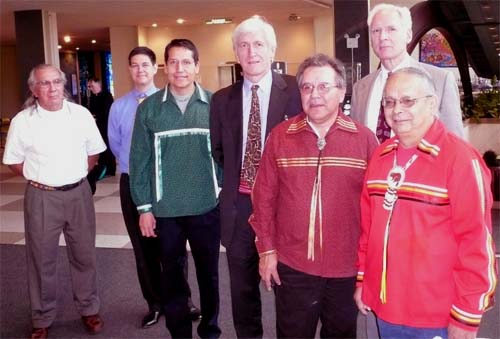Chief Karl Hill's Opening Statement of the Indigenous Peoples Caucus
at the Special Meeting of the Working Group to Prepare the
Draft American Declaration on the Rights of Indigenous Peoples
Washington, D.C., December 9-12, 2008
Ambassador Jorge Reynaldo Cuadros, Dr. Luis Toro of the Department of International Law, Maria Juliana Ruiz, Committee Secretary, Isabel Madariaga of the Inter-American Commission on Human Rights, distinguished representatives of Nation-States to the Organization of American States, my Indigenous brothers and sisters.
My name is Karl Hill and I am from the Cayuga Nation of the Haudenosaunee. In my language: "Nya-weh sgeno ga gwe-goh," which translates to "I am thankful you are well."
On the occasion of this Special Meeting of the Working Group to prepare the Draft American Declaration on the Rights of Indigenous Peoples, we are presented with a unique challenge. It is a time of historic change in the Americas, marked by the election to the Presidency of the United States of America of former Senator Barack Obama - a transformative individual, a citizen of the world, in whom people of all colors see themselves reflected, and who has succeeded in inspiring hope for humanity.
Today the world faces climate change and global economic crises. Much of it is caused by greed and the intent to make profit at any cost. As a result, Indigenous Peoples, their lands, territories and resources are being endangered and exploited. Thus, the Indigenous Peoples of the Americas are at the center of both of these crises. As the most marginalized peoples in the hemisphere, Indigenous Peoples stand to suffer the most from the global economic downturn and have the most to lose from the monumental and unpredictable effects of climate change.
The devastating early effects of global warming are being witnessed right now in the Arctic, as melting ice caps and coastal erosion cause Indigenous homes and schools to fall into the sea, and species such as seals and polar bear - on which the Inuit depend for food - are losing their prime habitat. In the Amazon and Meso-America, deforestation and forest fragmentation result in droughts and fires. These have traumatic effects on Indigenous Peoples of the region. Elsewhere in the Americas, extreme or unpredictable weather is causing floods and destroying Indigenous Peoples' crops, homes and livestock. This has led and will lead to food shortages, poverty, migration and the deaths of many people.
Throughout the Americas, Indigenous Peoples are the targets of human rights violations associated with efforts to confiscate, control or develop our lands and exploit our water without our consent. These acts are often perpetrated by multinational corporations, assisted by the very international development organizations that were created to relieve debt and poverty among the poor.
Indigenous Peoples are people of peace who can contribute significantly towards resolving the many crises facing humanity today. The American Declaration is of critical importance. It will address the regional challenges of Indigenous Peoples in the Americas while fully respecting the standards of the universal United Nations Declaration on the Rights of Indigenous Peoples. During this Special Meeting, we will engage in a discussion of the numerous ways in which the American Declaration can give regional focus to Indigenous rights. Some of the key issues include:
- - the detention and persecution of Indigenous leaders;
- - the militarization of Indigenous lands;
- - threats to Indigenous Peoples' water rights;
- - food security issues, including loss of traditional food sources, environmental degradation and genetically modified organisms;
- - climate change impacts-cultural, spiritual, physical and economic;
- - the importance of treaties and Native governance institutions;
- - the needs of isolated or un-contacted Indigenous Peoples;
- - lands and territories being used without our free, prior and informed consent for hydro-electric projects, extractive industrial projects and transnational highways;
- - political participation of Indigenous Peoples; and
- - the situation of urban Indigenous Peoples.
Notwithstanding the multitude of daunting issues pressing upon us, we have reason to be optimistic. Despite the setbacks in support from the United States and Canada, who were previously involved in our journey to draft an American Declaration, we have reason to believe that the new administration in Washington, D.C. may mean a change in position on the UN and American Declarations, before long. We invite Canada and Colombia to revisit their positions. The other OAS States may be in positions to influence that change in these States. The Indigenous Peoples Caucus urges the States' representatives turn your minds to such possibilities.
We call on the States to provide additional funding to the Specific Fund to ensure that we, as members of the Indigenous Peoples Caucus, can fully and effectively participate in this important process. We also invite you to join us in the International Day of Action for Indigenous Rights across the Americas, which calls for an end to human rights violations against Indigenous Peoples. Lastly, we call for the States to adopt and implement a strong American Declaration and fully implement the United Nations Declaration.
As we begin the work of the Special Meeting, the Indigenous Peoples Caucus calls on the Working Group to rise to the historic occasion for change and to respond with renewed vigor and determination to meet the needs, aspirations and rights of the Indigenous Peoples of the Americas.
Thank you.

Chief Stuart Patterson, Will David, Chief Karl Hill, Robert "Tim" Coulter, Chief Howard Thompson, John Lewis, and Chief Darwin Hill at the United Nations.
